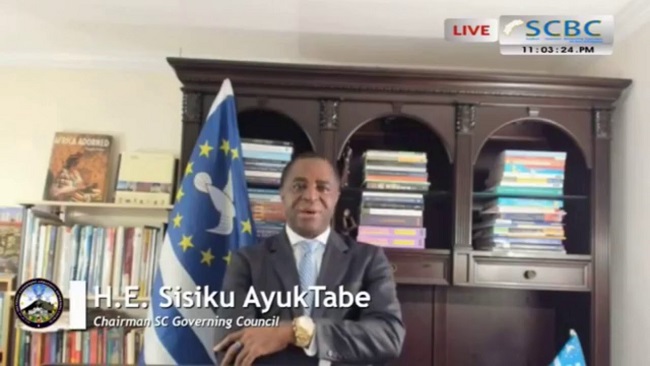Secessionist struggle in Southern Cameroons led from exile
A secessionist revolt is gaining ground in the English-speaking west of Cameroon, but for lack of charismatic local leaders, the impetus is coming from the Diaspora, analysts say.
On October 1, secessionist militants proclaimed the independence of Ambazonia, the name they give to the two Anglophone regions, provoking a crackdown by President Paul Biya’s security forces that left dozens dead and many injured.
ANGLOPHONE
The upheaval, which broke out at the end of 2016 and threatens to become an “armed insurrection” according to the International Crisis Group (ICG), was at first motivated by the Cameroon Anglophone Civil Society Consortium (CACSC), locally known as “the Consortium”.
Formed in December 2016, the Consortium chaired by Felix Nkongho Agbor Balla comprised four lawyers’ associations and several teachers’ unions, sharing a moderate attitude in favour of federal ties with the larger French-speaking parts of the country.
In January, the Consortium was dissolved and two leaders were arrested. They were later freed, but several others fled abroad, where their political stance hardened and they joined the ranks of the secessionists.
VIOLENCE
France and Britain divided up the one-time German colony under League of Nations mandates after World War I.
A year after the French-ruled territory became independent in 1961, the southern part of British Cameroons was integrated into a federal system that was scrapped 11 years later for a “united republic”.
In the Southwest and Northwest Regions, home to about 20 per cent of Cameroon’s population of 23 million, the secessionist struggle is waged “by local teams acting in semi-clandestine fashion”, says Mathias Eric Owona Nguini, an academic researcher specialised in geostrategic analysis in central Africa.
While differences over strategy and tactics remain, small secessionist groups have in recent months emerged to call for violence, particularly against the security forces but also against francophone citizens.
BATTLE
They intimidate hostile members of the local elite comfortable with the status quo. Yet the main political battle is “waged from abroad” by known individuals acting openly and favorable to independence of an Anglophone Ambazonia, says Nguini Owona.
Living in the United States, Julius Ayuk Tabe Sisiku, the self-proclaimed president of Ambazonia, has a personal guard detail.
A computer technician little known in Cameroon at large, Sisiku uses his Facebook page to give instructions to his followers. He also haunts the corridors of power to work quietly to win international recognition for his “country”.
Two exiled members of the Consortium, Wilfred Tassang and Harmony Bobga, have announced the creation of a “Southern Cameroons Ambazonia Consortium United Front” (SCACUF), which preaches independence and gives guidance in the fight against the Yaoundé government.
SECESSION
Exiled members of the old Southern Cameroon National Council (SCNC), a secessionist movement that was decapitated over the past two decades by the security forces, have joined the front.
Inside the country, a famed radio personality, Mancho Bibixy or “BBC”, came forward as the voice of the radicals in the Anglophone town of Bamenda in the Northwest. He was arrested in January and remains in jail accused of “terrorism”.
“This crisis also marked a generational renewal within the Anglophone movement and the Diaspora,” the ICG said in a report published in August. “The historic standard-bearers of the Anglophone question who came from the SCNC, the Cameroon Anglophone Movement or the AAC were not centre stage.
“Militants of the 1990s from Cameroon University who emigrated in the period after 1995 were succeeded by young people from Buea University and the University of Buea Student Union, who left Cameroon more recently.”
RADICALISATION
The “radicalization” of some Anglophones is the result of intensive “propaganda” activity launched from abroad on social networks, which feeds into the feelings of marginalization among local people, Nguini Owona says.
Separatists also have a cable television channel, the Southern Cameroon Broadcasting Corporation (SCBC TV), which is officially banned but operates from South Africa.
“Internet-based campaigns contributed to mounting public anger and increased the popularity of secessionist ideas,” the ICG said. “The Diaspora helped to give the crisis a higher profile at the international level.”
CRACKDOWN
But Cameroonians abroad did not provoke the revolt as they had in the past, the ICG noted. Their role became preponderant only after the arrest of leaders of the Consortium in January.
For the conflict prevention centre, separatist ideology is fuelled by crackdowns carried out by the regime, particularly the “murderous repression” of demonstrators who rallied to proclaim independence on October 1.
In such times, the ranks of the secessionists grow by the day. More and more of them are turning to the notion of “self-defence”.
Source: Daily Nation






25/10/2017 @ 08:33
TO CAMEROON INTELLIGENCE REPORT, SOUTHERN CAMEROON IS SEPARATING AND NOT SECEDING.YOU SHOULD STOP USING WORDS LIKE SECESSION AND SECESSIONIST ETC WHEN TALKING ABOUT SOUTHERN CAMEROON. LRC MEANS EAST CAMEROON , IN ACTUAL FACT BIYA AND CO ARE GUILTY OF SEPARATION.